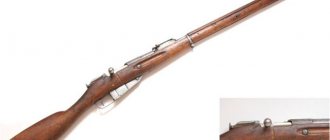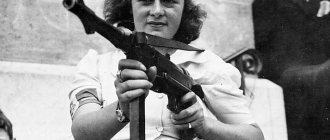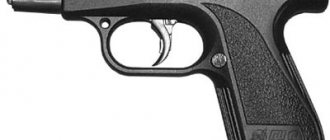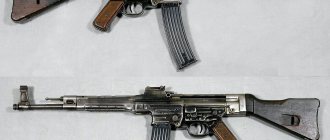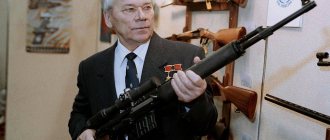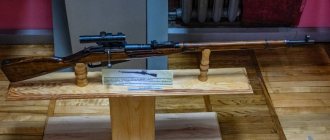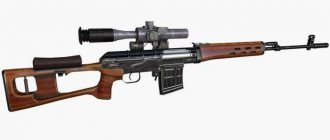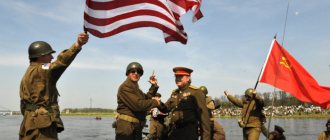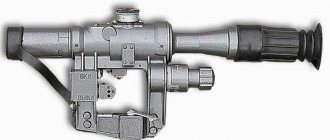so UNT / Textbooks on CVP / Textbook on CVP for 10th grades of secondary schools (Mektep 2010)
§ 4.3 Fire in battle. Fire system
Fire from all types of weapons is the main means of destroying the enemy in battle. He prepares the attack and leads the attacking units, and in defense he serves as the basis for its strength and invincibility.
Motorized rifle units can engage the enemy with individual fire weapons (infantry fighting vehicles, armored personnel carriers, machine guns, grenade launchers) or with concentrated fire. Concentrated fire (CO) is the fire of small arms, grenade launchers, weapons of infantry fighting vehicles (armored personnel carriers, tanks), conducted simultaneously by several fire weapons or several units at one target or at part of the enemy’s battle formation.
In the direction of fire, fire can be frontal, flank and cross (Fig. 10). Frontal is fire directed towards the front of the target. It is most effective when firing at an open target in depth. Flanking fire is fire directed at the flank of a target. It is most often fired from machine guns, as well as machine guns, against advancing enemy infantry. Crossfire is fired at one target from two or more directions; it is the most effective and causes great damage to the enemy. Fire
from machine guns and machine guns, opened suddenly from close distances in one specific direction, is called a dagger.
Units' fire weapons are used in battle according to the commander's plan, taking into account their purpose, capabilities and the nature of the terrain. All together they make up the fire system.
A defensive fire system is a combination of fire from all types of weapons organized according to a single plan to defeat the enemy.
The fire system must provide the ability to conduct all types of fire in front of the unit's front, on the flanks and in gaps with neighboring units, as well as the ability to conduct all-round defense.
When organizing a fire system, a unit (squad) is assigned a line of fire, an additional sector of fire (to the right or left). Fire weapons (infantry fighting vehicles, armored personnel carriers, machine guns) are determined by the main and reserve firing positions and the main and additional sectors of fire are indicated for the range of their actual fire. Fire from a grenade launcher is prepared in the squad's fire line. The fire lanes and sectors of fire of neighboring units and fire weapons must overlap each other. The readiness of the fire system is determined by the occupation of positions by fire weapons, the preparation of information for firing, and the availability of ammunition. For the convenience of fire control (for example, in defense), the squad leader draws up a fire card for his squad (Fig. 11).
Maneuver in battle.
Success in modern combat is unthinkable without the widespread use of maneuver by fire and units (forces and means).
In a battle, several targets of varying importance may appear simultaneously in front of the front of a squad (platoon): manpower, firepower, tanks and other combat vehicles. Concentrating the fire of an entire squad or several fire weapons on one important target (group of targets) in a timely manner, transferring it from one target to another for their sequential or simultaneous destruction - this means performing a fire maneuver. Every soldier can use the fire maneuver. To do this, he needs to continuously monitor the battlefield, identify targets and, as necessary, destroy them, transferring fire from one target to another.
Maneuver by units (forces and means) is carried out with the aim of occupying an advantageous position for firing at the enemy’s most vulnerable place or for attacking the flank and rear, as well as for getting out from under the attack of superior enemy forces.
In an offensive and in a counter battle, units can perform maneuvers in the form of envelopment and envelopment (Fig. 12).
Coverage
- this is a maneuver into the flank and rear of the enemy, carried out to a shallow depth in close fire and tactical cooperation with units operating from the front.
Bypass
- a deeper maneuver into the enemy’s flank and rear. It is carried out in tactical cooperation with units operating from the front.
In defense, the maneuver is carried out to strengthen units that have suffered losses, occupy reserve positions, firing lines, repel attacks of the enemy who has reached the flank or rear, and to carry out counterattacks.
Rice. 11. Squad fire card
Rice. 12. Types of maneuver: a - coverage; b - bypass
The experience of the Great Patriotic War and combat training of units in peacetime shows that maneuver in battle must be carried out quickly and covertly. For maneuver, open flanks, folds of terrain and hidden approaches are used, and in defense, in addition, trenches and communication passages are used. In modern combat, every soldier can use a maneuver; the maneuver allows the soldier to appear where the enemy least expects him.
Initiative and surprise in battle
. Experience in combat shows that the winner in battle is the one who is brave and does not get lost at the decisive moment, imposes his will on the enemy, shows his resourcefulness and reasonable initiative.
In combat, any soldier may find himself in a situation where he will have to independently decide what to do in order to complete the assigned task completely and on time. Initiative lies in the ability to find the best way to complete a given task in any situation, make a bold decision and implement it.
A resourceful and efficient soldier will always be able to take the initiative in any situation. The ability to show courage and reasonable initiative in battle, the willingness to take responsibility for the chosen method of action to destroy the enemy are valuable qualities of every soldier and commander. For any warrior, initiative is the norm of behavior in battle and in days of peace.
One of the main conditions contributing to achieving victory in battle is surprise. Surprise is an action that is unexpected for the enemy, which can take him by surprise, cause panic and deprive him of the ability to organize resistance. To achieve surprise, it is necessary to open fire unexpectedly, to act covertly, quickly and decisively in battle, and to maintain camouflage. The greatest effect is achieved by those who combine surprise with initiative and courage.
Questions and tasks:
1. What is the fire system called?
2. Tell us how the fire system is organized in the department.
3. What graphic document is compiled by the commander of a defensive squad?
4. What does it mean to perform a fire maneuver?
5. For what purpose is the maneuver carried out by units?
6. What types of maneuver do units carry out in an offensive and in an oncoming battle?
7. What kind of initiative can a warrior show in battle?
8. Complete tasks No. 5 and 6 in your workbook.
additional literature
- Chapter 6: Defense // Combat regulations of the airborne troops. Part II (battalion, company) / Rodnikovsky Yu.V. - Moscow: Military Publishing House of the Ministry of Defense of the USSR, 1984. - 304 p.
- Topic 7. Department in defense // [ebooks.grsu.by/takt_i_tech_podg/tema-7-otdelenie-v-oborone.htm Manual on tactical and technical training] / Rodionov A.N., Yankovsky V.I., Ostreyko I. .K., Dubovik A.S. - Grodno: Publishing House of the Grodno State University named after. Y. Kupala, 2007. - 288 p. — ISBN 978-985-417-936-0.
- Ezhov N.
[sc.mil.ru/files/morf/military/archive/arm_sb_2013-12.pdf Taking into account the capabilities of the units. The commander calculates the fire system] (Russian) // Army collection: magazine. - 2013. - December (vol. 234, no. 12). — P. 5-7. — ISSN [www.sigla.ru/table.jsp?f=8&t=3&v0=1560-036X&f=1003&t=1&v1=&f=4&t=2&v2=&f=21&t=3&v3=&f=1016&t=3&v4=&f=1016&t=3&v5 =&bf=4&b=&d=0&ys=&ye=&lng=&ft=&mt=&dt=&vol=&pt=&iss=&ps=&pe=&tr=&tro=&cc=UNION&i=1&v=tagged&s=0&ss=0&st=0&i18n=ru&rlf=&psz =20&bs=20&ce=hJfuypee8JzzufeGmImYYIpZKRJeeOeeWGJIZRrRRrdmtdeee88NJJJJpeeefTJ3peKJJ3UWWPtzzzzzzzzzzzzzzzzbzzvzzpy5zzjzzzzzzzzzzzzzzzzzzzzzzzzz zzzzztzzzzzzzbzzzzzzzzzzzzzzzzzzzzzzzzzzzzzzzzzyeyTjkDnyHzTuueKZePz9decyzzLzzzL*.c8.NzrGJJvufeeeeeJheeyzjeeeeJh*peeeeKJJJJJJJJJmjHvOJJJJJJJJfe eeieeeeSJJJJSJJJ3TeIJJJJ3..E.UEAcyhxD.eeeeeeuzzzLJJJJ5.e8JJJheeeeeeeeeeeeyeyeK3JJJJJJJJ*s7defeeeeeeeeeeeeeeeeeeeeeeeeSJJJJJJJZIJJzzz1..6LJJJJJJtJJZ4….EK*&deb ug=false 1560-036X].
Excerpt characterizing the defensive fire system
The fourth direction was the direction of which the most prominent representative was the Grand Duke, the heir to the Tsarevich, who could not forget his Austerlitz disappointment, where he, as if on display, rode out in front of the guards in a helmet and tunic, hoping to bravely crush the French, and, unexpectedly, finding himself in the first line , forcibly left in general confusion. The people of this party had both the quality and the lack of sincerity in their judgments. They were afraid of Napoleon, saw strength in him, weakness in themselves, and directly expressed this. They said: “Nothing but grief, shame and destruction will come out of all this! So we left Vilna, we left Vitebsk, we will leave Drissa. The only smart thing we can do is make peace, and as soon as possible, before they kick us out of St. Petersburg!” This view, widely spread in the highest spheres of the army, found support both in St. Petersburg and in Chancellor Rumyantsev, who, for other reasons of state, also stood for peace. The fifth were adherents of Barclay de Tolly, not so much as a person, but as a minister of war and commander in chief. They said: “Whatever he is (they always started like that), but he is an honest, efficient person, and there is no better person. Give him real power, because war cannot go on successfully without unity of command, and he will show what he can do, as he showed himself in Finland. If our army is organized and strong and retreated to Drissa without suffering any defeats, then we owe this only to Barclay. If they now replace Barclay with Bennigsen, then everything will perish, because Bennigsen has already shown his inability in 1807,” said the people of this party. The sixth, the Bennigsenists, said, on the contrary, that after all there was no one more efficient and experienced than Bennigsen, and no matter how you turn, you will still come to him. And the people of this party argued that our entire retreat to Drissa was a most shameful defeat and a continuous series of mistakes. “The more mistakes they make,” they said, “the better: at least they will sooner understand that this cannot go on. And what is needed is not just any Barclay, but a person like Bennigsen, who already showed himself in 1807, to whom Napoleon himself gave justice, and such a person for whom power would be willingly recognized - and there is only one Bennigsen.” Seventh - there were faces that always exist, especially under young sovereigns, and of which there were especially many under Emperor Alexander - the faces of generals and a wing of adjutants, passionately devoted to the sovereign, not as an emperor, but as a person, adoring him sincerely and disinterestedly, as he adored him Rostov in 1805, and seeing in him not only all the virtues, but also all human qualities. Although these persons admired the modesty of the sovereign, who refused to command the troops, they condemned this excessive modesty and wanted only one thing and insisted that the adored sovereign, leaving excessive distrust in himself, openly announce that he was becoming the head of the army, would make a himself the headquarters of the commander-in-chief and, consulting where necessary with experienced theorists and practitioners, he himself would lead his troops, which this alone would bring to the highest state of inspiration. The eighth, largest group of people, which in its sheer numbers related to others as 99 to 1, consisted of people who did not want peace, nor war, nor offensive movements, nor a defensive camp either at Drissa or anywhere else. there was no Barclay, no sovereign, no Pfuel, no Bennigsen, but they wanted only one thing, and the most essential: the greatest benefits and pleasures for themselves. In that muddy water of intersecting and entangled intrigues that swarmed at the main residence of the sovereign, it was possible to accomplish a lot in ways that would have been unthinkable at another time. One, not wanting to lose his advantageous position, today agreed with Pfuel, tomorrow with his opponent, the day after tomorrow he claimed that he had no opinion on a certain subject, only in order to avoid responsibility and please the sovereign. Another, wanting to gain benefits, attracted the attention of the sovereign, loudly shouting the very thing that the sovereign had hinted at the day before, argued and shouted in the council, striking himself in the chest and challenging those who disagreed to a duel, thereby showing that he was ready to be a victim of the common good. The third simply begged for himself, between two councils and in the absence of enemies, a one-time allowance for his faithful service, knowing that now there would be no time to refuse him. The fourth kept accidentally catching the eye of the sovereign, burdened with work. The fifth, in order to achieve a long-desired goal - dinner with the sovereign, fiercely proved the rightness or wrongness of the newly expressed opinion and for this he brought more or less strong and fair evidence.

